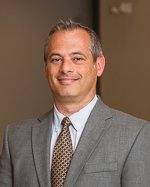
This post is the 16 in Project Legacy, a series of interviews that aim to learn from leaders outside of education to influence those inside education. See our most popular posts in Project Legacy on Mayor James Brainard and Northview Pastor Steve Poe.
I sat down with Marcus Schrader, the Dean of the College of Biblical Studies (also a pastor, president of the amazing ministry Workforce Chaplains and father to seven kids) to learn about his perspective on children, education and ministry. These are the top three lessons for leaders, parents and educators.
Lesson 1: Children Imitate Their Parents
When I asked Marcus why he worked at a bible college and was so involved with different ministries, he responded,
“I grew up at seminaries and Bible colleges. My dad was a professor at Liberty in Lynchburg, Virginia and I grew up with college and seminary students at the dinner table. I knew the words hamartiology, ecclesiology and eschatology long before my own theological education. So going to Bible college like my dad was just the natural fit. When I finished and had the opportunity to work at a Bible college, it just made sense and I did not have a calling to anything else.”
In my last post, an interview of Reverend Green, I explain that all men are called to one savior, but to different areas of service. In Marcus’ situation, the default call was to do what his father did. What if parents today lived and led their families as if their kids were going to simply do what their dads did? Paul wrote, “Follow me as I follow Christ” and as a result had many spiritual children of his own.

Although there are distinctives between Marcus’ calling and that of his father, I found it compelling that it was the most natural fit for him to imitate what his dad had done. Parents, leaders and educators need to keep in mind that their kids and followers will find it most natural, in most cases, to do what their parents did.
Going to church, singing at the dinner table, memorizing scripture, serving those in need, and whatever else you find valuable— if its not part of the family routine, the kids likely will not carry it on. This is why true education is much more enculturation (the passing on of a culture) than it is the passing of information.
Lesson 2: Children Are a Blessing

When I asked Marcus why him and his wife of 23 years decided to have seven kids, he responded,
“It just made sense, because we think kids are a blessing. Early in our marriage, I read the book Successful Christian Parenting by John MacArthur and he said there are two perspectives on children. One approach sees them as a burden. They are a burden financially. They are a burden to our freedoms and schedules. They are a burden because of all of the additional responsibilities. On the other hand is the biblical perspective which sees children as a blessing.”
They continued to grow their family because they saw each of their children as a blessing despite all of the additional demands upon their time, money and energy.
How might your leadership of kids be different if your mindset was, “No matter what comes because of this, this child is a blessing.” Doing this requires looking not just at what a child should be, but what a child could be. The eye of unbelief only sees the gaps and cracks and errors and what should be. But the eye of faith is able to see what is possible with God in the life of a child if the parents see them as a blessing.
Our children can sense in our very presence whether we see them as a burden or a blessing. What a challenging and convicting thought!

Lesson 3: Children Need Friends
This is perhaps the most obvious post I have ever written, but it’s often a leader’s job to remind folks of what they already knew to be true, but have neglected to apply. Jesus in Matthew 7:24 says,
“Therefore, if anyone hears these words of mine and does them will be like a wise man who built his house upon the rock.”
Marcus is the type of leader that possesses a congruence between his words and his actions. One of the most interesting things going on in his life and leadership is the chaplaincy organization that he leads. He shared with me that most adults in the corporate world have no real friends. I found this both shocking and tragic that the majority of working adults with a good standard of living are going through life without any real relationships! He shared that the chaplain’s first job is to make a connection with these folks that will never step foot inside a church door.

Marcus shared,
“It is much easier to move from the natural to the supernatural and from the physical to the spiritual if there is an existing friendship.”
As I wrote in my post interviewing David Bell, we need to build the bridges of grace that can handle the weight of truth. Grace and truth grow in the context of authentic community. Parents, educators and leaders need to spend time investing in relationships where people feel known and loved. Going through life without a connection to an authentic community is no way to live.




